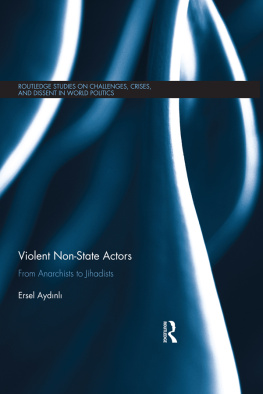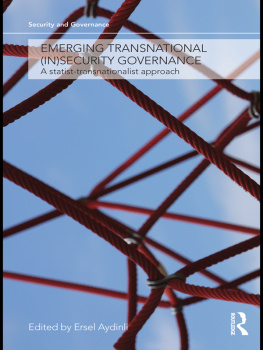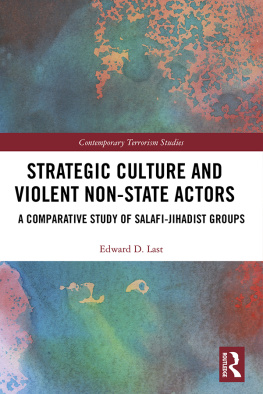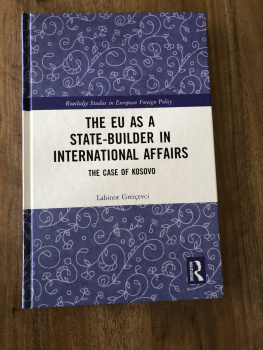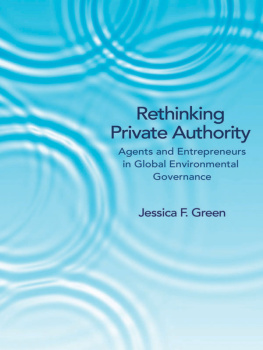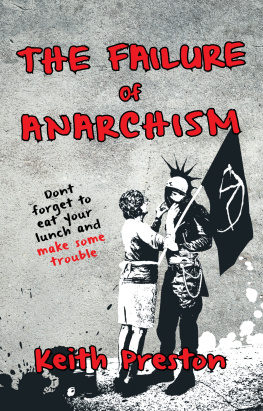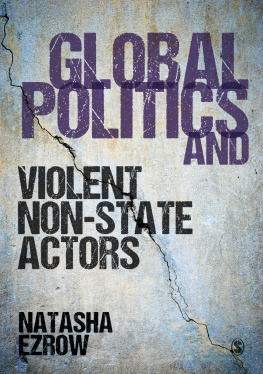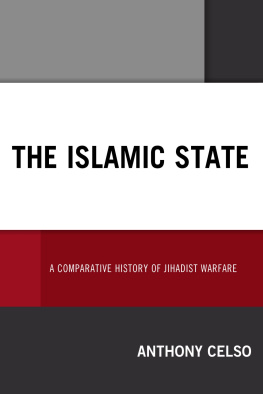Violent Non-State Actors
Given the importance of violent non-state actors (VNSA) and their evolving role in global politics, dynamic frameworks of analysis are needed both to trace historical trajectories in the evolution of violent non-state actorness and to identify emerging patterns by examining modern day cases.
This book examines the defining characteristics and evolutionary dynamics of VNSAs, and introduces a framework based on their autonomy, representation, and influence providing a comparative analysis of the late nineteenth and early twentieth centuries Anarchist movement and the modern- day Jihadist network. It explores the distinct characteristics of the Anarchists and Jihadists as VNSAs with global potential, not just describing them, but also seeking to understand what they are instances of. With a longitudinal analysis, the book also considers the types of changes that have occurred in the past 150 years and the possible role VNSAs may play in current and future power polity shifts away from states toward non-state actors. It concludes with both theoretical implications for the study of non-state actors and transnational relations, and practical implications for government agencies or private groups tasked with finding ways of countering such violent non-state actors.
This important book will be of interest to students and scholars of international relations, political science, and terrorism/security studies. It will also be of interest to practitioners in the security services, including think-tank analysts and government security analysts.
Ersel Aydnl is Professor of International Relations at Bilkent University, Turkey. His research areas include transnational relations and security, sociology of the IR discipline, and homegrown theorizing.
Routledge Studies on Challenges, Crises, and Dissent in World Politics
Series editors: Karoline Postel-Vinay
Centre for International Studies and Research (CERI), France
and
Nadine Godehardt
German Institute for International and Security Affairs, Germany
This new series focuses on challenges, crises, and dissent in world politics and the major political issues that have surfaced in recent years. It welcomes a wide range of theoretical and methodological approaches including critical and post-modern studies, and aims to improve our present understanding of global order through the exploration of major challenges to inter/national and regional governability, the effects of nationalism, extremism, weak leadership, and the emergence of new actors in international politics.
1 Empires of Remorse
Narrative, postcolonialism and apologies for colonial atrocity
Tom Bentley
2 Crisis and Institutional Change in Regional Integration
Edited by Sabine Saurugger and Fabien Terpan
3 Violent Non-State Actors
From Anarchists to Jihadists
Ersel Aydnl
First published 2016
by Routledge
2 Park Square, Milton Park, Abingdon, Oxon OX14 4RN
and by Routledge
711 Third Avenue, New York, NY 10017
Routledge is an imprint of the Taylor & Francis Group, an informa business
2016 Ersel Aydnl
The right of Ersel Aydnl to be identified as author of this work has been asserted by him in accordance with sections 77 and 78 of the Copyright, Designs and Patents Act 1988.
All rights reserved. No part of this book may be reprinted or reproduced or utilized in any form or by any electronic, mechanical, or other means, now known or hereafter invented, including photocopying and recording, or in any information storage or retrieval system, without permission in writing from the publishers.
Trademark notice: Product or corporate names may be trademarks or registered trademarks, and are used only for identification and explanation without intent to infringe.
British Library Cataloguing in Publication Data
A catalogue record for this book is available from the British Library
Library of Congress Cataloging in Publication Data
Aydinli, Ersel, 1967 author.
Title: Violent non-state actors : from anarchists to jihadists / Ersel Aydinli.
Description: Abingdon, Oxon ; New York, NY : Routledge, 2016. |
Series: Routledge studies on challenges, crises and dissent in world
politics | Includes bibliographical references and index.
Identifiers: LCCN 2015050373| ISBN 9780415843478 (hardback) |
ISBN 9781315561394 (ebook)
Subjects: LCSH: Non-state actors (International relations) | Political
violence. | Terrorism. | Security, International. | TerrorismPrevention. |
AnarchismHistory. | JihadHistory20th century. | JihadHistory
21st century.
Classification: LCC JC328.6 .A94 2016 | DDC 363.325dc23
LC record available at http://lccn.loc.gov/2015050373
ISBN: 978-0-415-84347-8 (hbk)
ISBN: 978-1-315-56139-4 (ebk)
Typeset in Times New Roman
by Wearset Ltd, Boldon, Tyne and Wear
1
Tracing violent non-state actorhood in global politics
How important are non-state actors? Well, one non-state actor, the Jihadists, with the help of another non-state actor, Fox TV, were able to bring the great American superpower into a war against all kinds of other shadowy non-state actors. I guess that answers the question.
Pakistani President Asif Ali Zardari, May 2011, Ankara, Turkey
Power in global politics is shifting in at least two distinct ways. The first is in a geographical sense, with power moving from certain traditionally strong states or regions, such as the West, or Europe, to other states and regions, for example, the East, or Eurasia. More interesting though, perhaps, is a parallel shift in the power of polities,
The second of these shifts is arguably more transformative in terms of the effect it is having on the nature of global politics. Geographical shifts still constitute changes taking place within the state system, so while the names of the dominant actors may be altered, the basic patterns of practices and behaviors can be expected to remain more or less the same. A polity shift, however, is a substantially different kind of change, with potential effects that we still know relatively little about. Not only are the numbers and types of actors proliferating beyond states, but with these new actors increasing involvement in transnational politics, even the most principled traditional concepts and patterns of relations can no longer be counted on as building blocks for scholarly inquiry or speculation. For example, a concept such as Anarchy, upon which so much of modern international relations scholarship was built, may be seeing a qualitative change to a form that is more raw and, indeed, Anarchic than in past understandings; non-state actors may not react in predictable ways to traditional state behaviors, such as to acts of deterrence; and it remains unclear what happens to classic patterns of alliances or balancing when non-states begin to take a role.
our understandings of what it means, the context in which it is occurring, and the nature of the actors driving it, remain dispersed and in that sense, limited. The starting point to understanding the shift lies arguably in further conceptualization of its primary actorsnon-states. For international relations, the state, and the (fairly) common understanding of what it was and what it meant, has long provided a pillar around which scholarly inquiry could be built up. Whether in a positive or negative sense, whether the state is your punching bag or your main-stay, it has provided some kind of clarity and a reference point against which, or to which, scholarship can refer. When it comes to non-state actors however, we have far less comprehensive research on what they are, how they interact, and how they may be changing over time. If we accept that a polity shift is occurring, we must develop a deeper understanding of this form of agency. Only with such understandings can we begin to fully analyze the implications of this shift for our existing knowledge of global affairs, from the implications for basic concepts like Anarchy or sovereignty, to those for basic patterns and practices, such as alliance building or power transitions.

